AirCertifyNZ
The AirCertifyNZ programme supports Regulated Air Cargo Agents (RACA) to meet their responsibilities under civil aviation rule (CAR) 109 about the validation and oversight of ‘known customers’. This ensures that the security outcomes of CAR’s will continue to be met providing ongoing assurance and integrity of the civil aviation secure supply chain.
AirCertifyNZ is a ground-breaking Industry initiative designed to revolutionise the way air cargo security compliance is achieved and maintained, offering a united and efficient approach that addresses the concerns faced by all.
In a collaborate effort, AirCertifyNZ combines the expertise of CBAFF, OneReg and IVS, empowering all participants in the export air supply chain to ensure robust processes and safeguards are in place for air cargo, thereby preventing any unintended interference.
The programme is designed to strengthen New Zealand air cargo security.
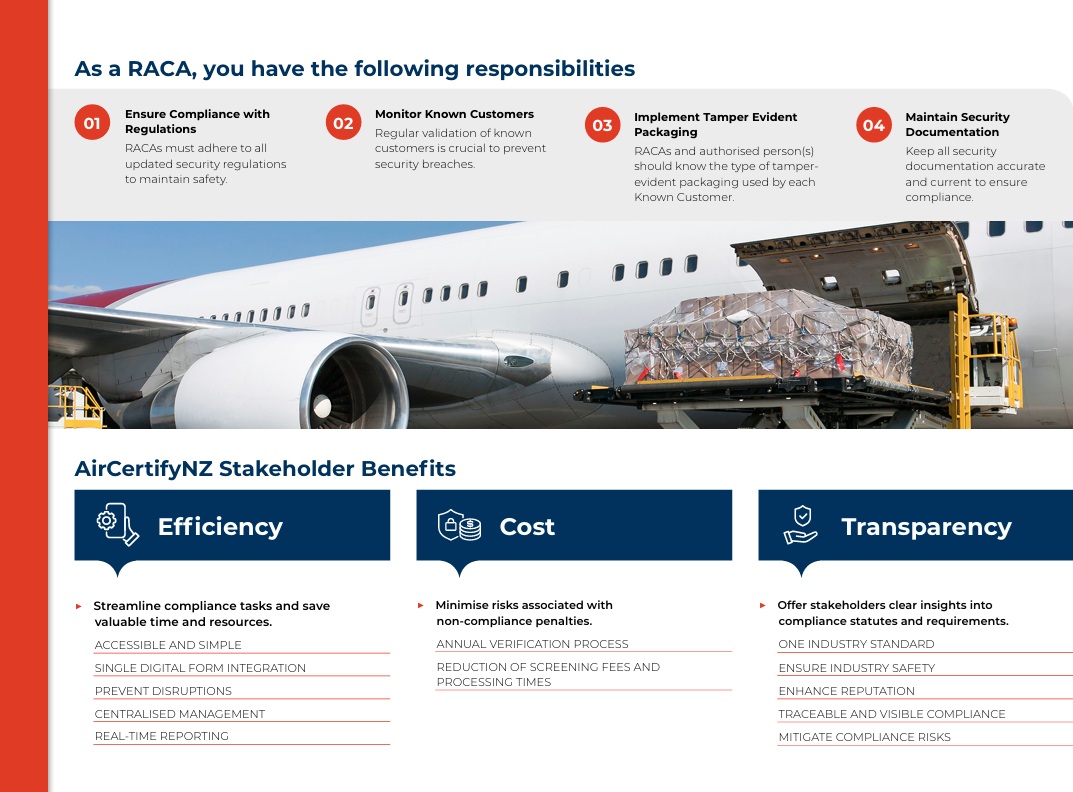
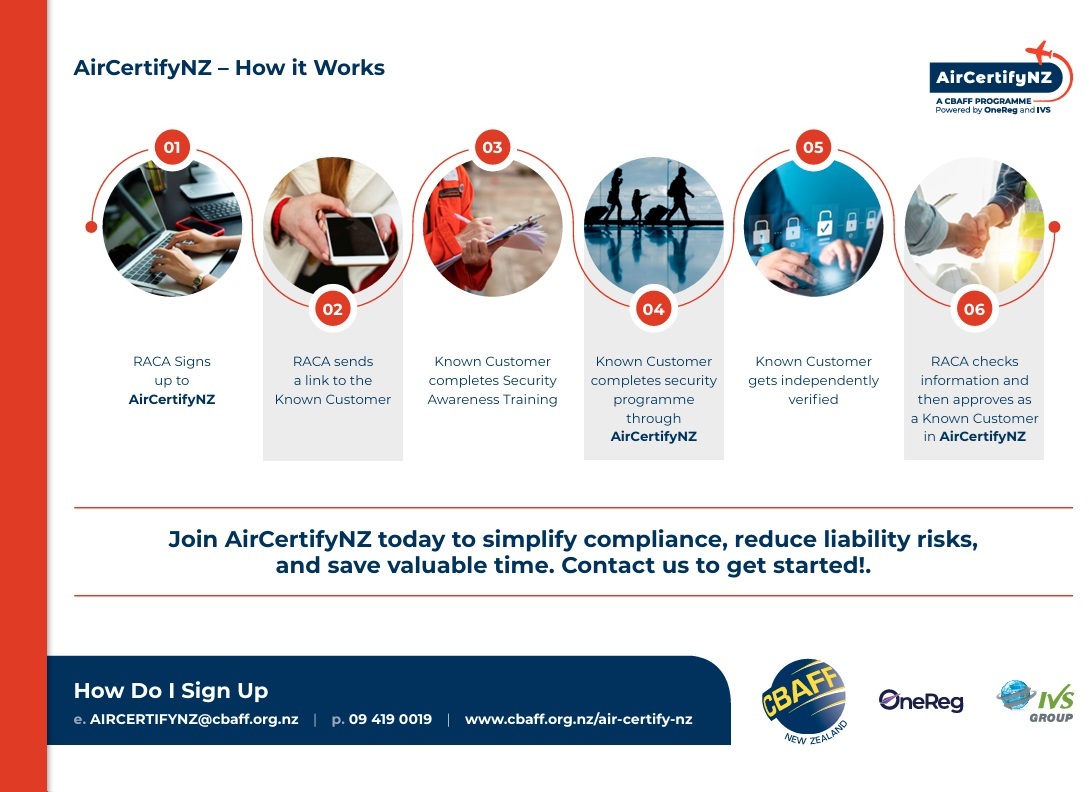
- FAQ - General
- How do I report incidents?To report incidents, use OneReg for real-time reporting or submit them manually to the CAA. Ensure that both incidents and non-conformances are reported.Is my data secure?OneReg is enterprise-level software trusted by international organisations. Your subscription ensures that no one can access your data without your permission.RACA and other external parties cannot access the Known Customer database directly. Access is restricted to maintain privacy and the integrity of Known Customer verifications.IVS manages all Known Customer verifications and updates these records. The content of this is only shared with you if the Known Customer has linked their account to you. OneReg does not access or control Known Customer status.The CAA cannot access your account unless you grant them access for auditing. You have complete control of this access and can adjust the level or revoke it completely as you see fit.What training is available?We are here to help you. CBAFF will be hosting several webinars and in person events for RACA and Known Customers.How do I become a RACA?Refer to the CAA guidelines for becoming a certificated regulated air cargo agent.How does trucking fit into this program?Known Customers and RACA need to ensure what measures are in place to ensure that vehicles/freight remain secure during transport from the Known Customer through to the RACA, through to the CTO, equally what training and procedures are provided to the driver responsible for the secure transportation of air cargo to the RACA/CTO.Will the CAA accept AirCertifyNZ as part of an approved scheme, such as SES?We are working with CAA to meet the requirements now and to develop a robust programme to meet the needs for the future.What if I want to opt out of the program?Who can I contact for support?
- FAQ - RACA
- What is a Known Customer Register?RACAs are required to keep an up-to-date list of their Known Customers (register), with the appropriate details required by CAA being detailed. AirCertifyNZ has incorporated this requirement into AirCertifyNZ to support RACAs obligations under Rule 109.Does the program cover mail?No, the program is specifically for air cargo shipments.How can I re-train and register our staff?If using OneReg for Exposition Management/AirCertifyNZ, you can track training records and renewals in the system. Additional courses are available through:What benefits does my Known Customer receive?They will receive a complimentary IVS Air Cargo Security Awareness Training, access to an online portal, streamlined audits with all RACAs, annual procedure verification, and prompt updates on information and incidents. Additionally, they will benefit from just one verification per year, eliminating the confusion of multiple RACA visits. For example, instead of spending 12 hours across four RACA visits, they will only need 2-3 hours for a single verification.How should I phrase my exposition when using AirCertifyNZ?When preparing your exposition to include AirCertifyNZ, please ensure it adheres to the CAA’s specific guidelines. It is important to include all necessary information for submission and approval. Please integrate terms like “or suitably authorised personnel” where relevant. This will assist in meeting compliance requirements and streamlining the approval process.How do I authorise IVS to act on my behalf?Refer to 109.59 Authorisation Procedures - A RACA must establish procedures to issue authorisations to its personnel or contractors for security control functions related to the RACA’s activities. These personnel must be trained according to the RACA’s training program outlined in rule 109.63.The RACA must provide a letter of authorisation to IVS and specify that the training and security information must be presented/displayed at time of the verification being conducted.What are the costs for a RACA to sign up with AirCertifyNZ?Contact CBAFF for detailed cost information related to managing your Known Customer base.What are the requirements for our cartage team?If the RACA intends to use a third party to transport the consignment to the air operator, then agreed and documented procedures need to be established (between the RACA and the third party) to ensure that the integrity of security controls applied to the consignment are maintained during transportation to the air operator. This may include processes that allow for identification of any tampering with the consignment of cargo or mail during the transportation process.Why does my Known Customer need to comply with these requirements?To safeguard aircraft and uphold regulatory standards, ensuring both their safety and operational integrity.Why should the warehouse access AirCertifyNZ platform instead of printing the Known Customer Register?AirCertifyNZ provides real-time updates, ensuring that Known Customer information is current.What if my Known Customer does not want to complete the forms?CBAFF offers training webinars and videos to assist. Alternatively, the Known Customer can choose to be Unknown and have their cargo fully screened.What can I charge Known Customers?Pricing decisions are up to you and are not managed by AirCertifyNZ.Is my SES Partners exempt from verification?No, SES Partners are not exempt from verification but can simplify the process by using AirCertifyNZ. A RACA may accept SES Partners as a known customer, provided that, the RACA has a system in place to gain assurance of the Known Customer’s continued membership of the NZCS SES, and that the RACA has systems and processes in place to ensure that any cargo which arrives does so in a tamper evident manner, or that cargo which shows signs of having been tampered with is treated as unknown.How should I manage exposition management outside the AirCertifyNZ program?Expositions do not have to be in AirCertifyNZ/OneReg; however, we encourage RACAs to use the technology and the software to move away from paper based to an online programme.
- FAQ - Known Customers
- Why are these changes happening?The security regulations for airfreight exports from New Zealand have become increasingly complex over time. This has led to ambiguous interpretations and decreased operational efficiency for New Zealand Regulated Air Cargo Agents.What are the types of air freight?Air freight can be classified as Secure or Un-Secure. Un-secure freight must be screened before it can be exported/loaded onto aircraft.What distinguishes a Known Customer from an Unknown Customer?A Known Customer is a cargo packer who has requested registration, provided their information, and been approved by a RACA/s. An Unknown Customer has not been registered or subjected to security controls.A Known Customer must have an organisation security programme that makes a commitment about their organisation’s approach to security to by turning it into something tangible.More detailed information can be found in Appendix C of the AC109-1Am I a Known Customer or a RACA?A Known Customer is a cargo packer who has been registered and approved. A RACA is a certified regulated air cargo agent under Part 109 regulations.We only import shipments via Air, should I register as a Known Customer?You only need to register as a Known Customer if you are packing or exporting shipments by air. Otherwise, registration as a Known Customer is not required for all exporters.Why should I be a Known Customer instead of just having cargo screened?Being a Known Customer can save time and cost and ensures a more resilient supply chain.What is the alternative to these changes?Ensure your freight is fully screened through alternative methods such as: -
- Conventional x-ray equipment
- Advanced technology x-ray explosives detection system (ATEDS)
- Explosive trace detection (ETD) systems
- Explosive detection dogs
- Computed tomography
- Physical inspection
For large items, manual screening will be required, and dependent on the RACA/appropriate techniques for your goods / location.Can I have multiple logins as a Known Customer?Yes, OneReg supports up to ten logins per site.Who can assist me with filling out my questionnaire?How long does the Known Customer verification process take?Dependant on completing/supplying all relevant information to a suitable standard, the complete process including verification takes 2 weeks, starting with the Known Customer registration with the completion of the online AirCertifyNZ security programme. IVS will review and keep you updated on the scheduling of your verification visit and outcomes.What happens during the verification process?IVS will provide details on what to expect once your verification visit is scheduled. The onsite verification will take approximately 2 hours. This information will be supplied once you have submitted.How and when will I know the outcome of my verification?The verification will have one of three outcomes, subject to ratification by the RACA.- Acceptable
- Acceptable with conditions – minor changes required
- Unacceptable - non-conformances identified at the verification have been rectified and another verification has been successfully completed
How can I provide awareness training for our staff?CBAFF have some tools/documents to assist and encourage all to do the IVS online training and we hope to run training webinars in the future.Do I need to register all my sites as Known Customers if I have multiple locations?Each site needs to be registered individually as a Known Customer because no two sites are the same and each has unique operational requirements. Each site must be inspected separately to ensure they can demonstrate their security program effectively.What is tamper evidence, and what does it look like?RACAs and authorised personnel should be familiar with the tamper-evident methods used by each of their Known Customer. The RACA and authorised person(s) should know the type of tamper-evident packaging used by each known customer and the guidance flyer.Who determines the costs?The costs are determined by IVS/CBAFF. AirCertifyNZ offers a robust industry standard for becoming a Known Customer, streamlining the process, eliminating redundancies, and standardising the procedure.The benefits include - A single digital form, integration with multiple RACA’s, enhanced assurance, annual verification, centralised compliance, selective RACA approval, audited compliance, elimination of screening fees, prevention of flight delays, a Known Customer template, cost-effectiveness.Why is the cost annual?Annual verification addresses the need to adapt to changes in your business over the year. Furthermore, RACAs are required to regularly monitor Known Customers', ensuring that records remain up to date and that all staff are consistently reminded of their responsibilities.What should I do if we do not have a security program?Many companies already have quality assurance and health & safety programs that can be adapted to meet security requirements; however it is essential to regularly test these methodologies. An organisation’s security programme makes a commitment about their organisation’s approach to security to by turning it into something tangible. CBAFF have some tools/documents to assist and encourage all to do the IVS online training and we hope to run training webinars in the future.What does a security culture entail?It’s like any health and safety culture in many ways and it encompasses establishing, monitoring, reporting, and addressing security issues. To learn more, visitWhy has the CTO or Depot rejected my freight?Rejection could be due to damage, compromised security, or tamper evidence methods not matching as recorded. CTOs adhere to strict standards as the final check before loading.How can I identify if my Freight Forwarder is a RACA or a Non-RACA?Ask your freight forwarder for their unique code or OneReg link.Is the verification process different for SES Partners?No, SES partners may find it easier because they have prepared so much info for New Zealand Customs already.What if one of my RACAs is not part of AirCertifyNZ?We recommend talking to your RACA and encouraging them to join AirCertifyNZ.Do I need to be verified by all RACAs if I use several?Once verified, you can use the unique code supplied by each RACA to link with your RACAs. Each RACA will still need to review and accept you as a Known Customer. - Common Definitions
- Authorised PersonSomeone who is authorised under rule 109.59 to carry out all or any of the security control functions applicable to the RACA’s activities.Cargo Security IncidentAn incident involving cargo or mail that is carried, or has been accepted by a regulated air cargo agent or an air operator for carriage, by air on an aircraft conducting an international regular air transport operation passenger service, and: (1) there is evidence of tampering or suspected tampering with the cargo or mail which could be an act or an attempted act of unlawful interference, or (2) a weapon, explosive, or other dangerous device, article or substance, that may be used to commit an act of unlawful interference is detected in the cargo or mail.Declaration of SecurityA declaration made in accordance with the requirements of rule 109 regarding a consignment of cargo or mail.IncidentsEvents which compromise or impact the integrity and/or security or cargo and or mail, including (but not limited to) potential and/or actual breaches of security.Known Customer (KC)A shipper of cargo or mail who has an established association with a RACA or an air operator for the carriage of the shipper’s cargo or mail by air and who is registered with the RACA or the air operator. A Known Customer is the cargo packer who has asked to be registered as a known customer, provided their information, and has been visited and approved by a RACA. This known customer must have a Known Customer Security Programme which includes a knowledge of security matters relating to the packaging and carriage of their cargo by air. This programme will demonstrate appropriate systems and procedures for ensuring that only the intended items of cargo are contained in the consignment.New Zealand Customs Service (NZCS) Secure Exports Scheme (SES)A programme that certifies New Zealand exporters who meet NZCS secure supply chain expectations, to help these exporters clear customs. Exporters joining the scheme need to ensure their goods are packed, stored, and transported in a way that meets global customs standards.Part 109 CertificateA certificate granted by CAA under Part 109, which allows an operator to act as a RACA. In previous revisions of this AC, sometimes referred to as a RACA certificate.Regulated Air Cargo Agent (RACA)A holder of a Part 109 certificate granted under section 9 of the Act or the equivalent section of the Civil Aviation Act 2023 and in accordance with Part 109.ScreeningThe application of technical or any other means to detect a weapon, explosive, or other dangerous device, article or substance, that may be used to commit an act of unlawful interference. Note: Certain dangerous articles or substances are classified as dangerous goods and must be transported in accordance with Part 92.Security ControlA method used to prevent the introduction on board an aircraft or at an aerodrome, of a weapon, explosive or other dangerous device, article or substance that may be used to commit an act of unlawful interference.Security ProgrammePolicies, records, and procedures which: 1) detail information about a known customer’s operation and how they apply security controls and measures, and 2) provide assurance to a RACA that the policies and procedures outlined by a known customer meet the RACA’s requirements.Security CultureA strong security culture is crucial in preventing the introduction of an assembled IED into the Secure Supply Chain and on to an aircraft.Statement of ContentAn accurate description of the items that are contained within a consignment of cargo or mail for carriage by air.Tamper EvidentDefinition: “tamper evident” (of packaging) designed to reveal any interference with the contents.The RACA and authorised person(s) should know the type of tamper-evident packaging used by each known customer.One method of maintaining the secure status of a consignment is to have the consignment sealed. A seal may be on individual cartons/items of freight or encompass a larger consolidated consignment in palletised or other form.Where a seal is used it must be capable of displaying identifiable evidence of any tampering to the RACA’s authorised person who is accepting the consignment into the RACA’s facility.Unknown CustomerA customer that has not been registered as a known customer, and whose cargo has not had security controls applied to it.
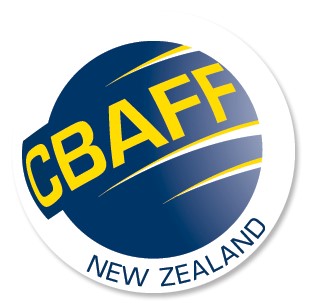
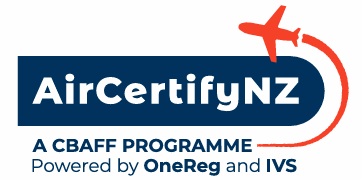
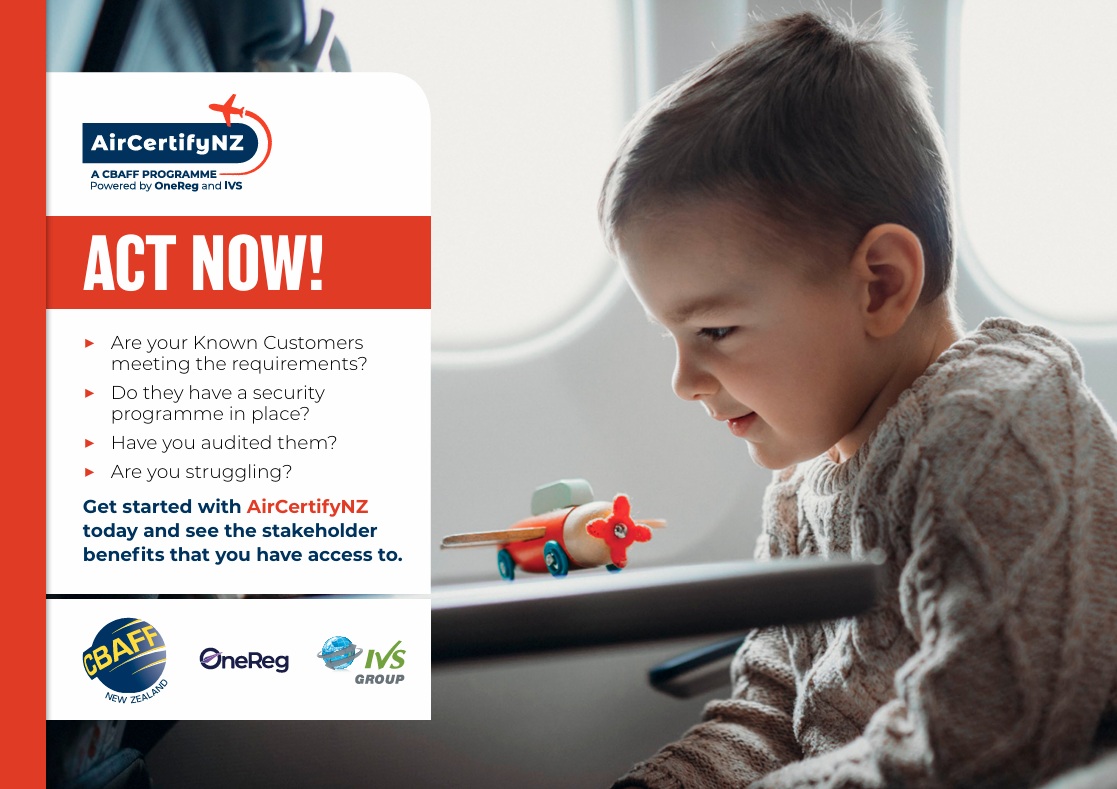
RSS Facebook Email Linkedin